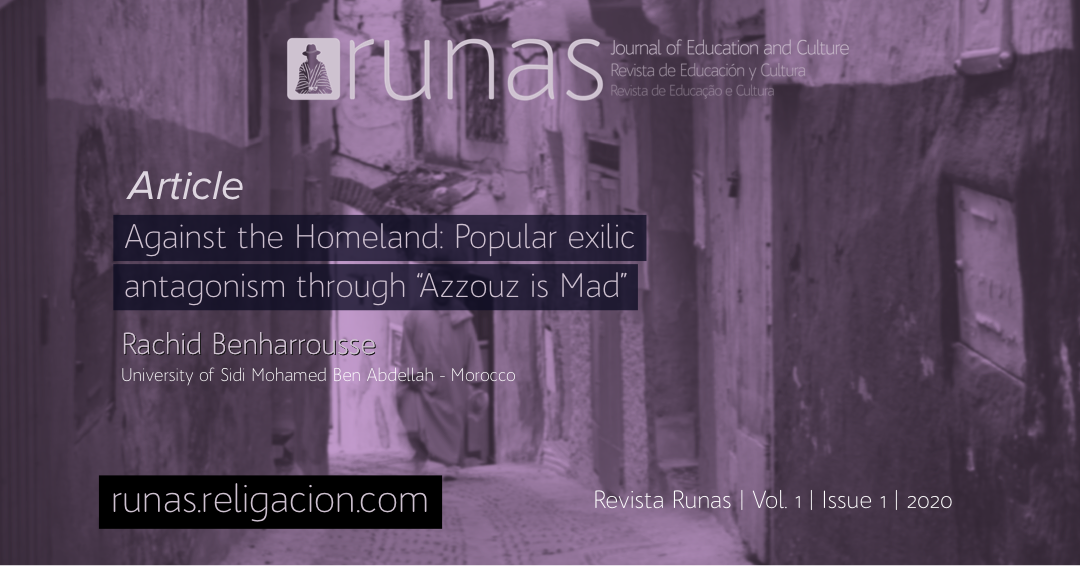Resumen
Los YouTubers marroquíes de la diáspora son silenciados o descuidados porque usan un lenguaje vulgar y aunque se están convirtiendo en parte de la cultura popular marroquí, los investigadores parecen pasar por alto sus opiniones sociopolíticas sobre Marruecos. Por lo tanto, el artículo investigará cómo Richard Azzouz, el más famoso Youtuber de la diáspora marroquí, ve a Marruecos y a sus ciudadanos. Azzouz ve a Marruecos como un lugar de esclavitud y opresión porque Marruecos es un reino con su propia monarquía. Azzouz representa el "Modo Antagónico" de Stéphane Dufoix ya que está en contra del estado-nación y resiente la cultura "árabe" que promueve. Intenta valorizar la identidad amazigh sobre la árabe mediante la valorización de la identidad americana. Sin embargo, su intento de valorar la identidad amazigh se convierte en una devaluación de su propia identidad porque su "americanidad" es mejor que todas las demás identidades. El uso del vídeo "Azzouz is Mad" a través de una lectura atenta pone al descubierto sus reivindicaciones de "superioridad" y "libertad" ya que se asocia a los Estados Unidos. Luego, el documento argumenta que la visión de Marruecos como un sitio de esclavitud es compartida por las diásporas marroquíes y la juventud marroquí. Azzouz, al igual que otros YouTubers de la diáspora, se asocia con la hostilidad por la legitimidad, pero Azzouz cae en la paradoja de que la posición que le otorga la legitimidad niega su visión de la valorización. Así pues, el documento da voz a las opiniones sociopolíticas de Azzouz y, a través de él, a todos los exiliados antagonistas marroquíes; mientras que, también, traza los deslices de su discurso.
Citas
Acharoui, Z., Alaoui, A., Ettaki, B., Zerouaoui, J., & Dakkon, D. (2020). Identifying Political Influencers on YouTube during the 2016 Moroccan General Election. International Workshop on Statistical Methods and Artificial Intelligence, 170, 1102-1109. https://doi.org/10.1016/j.procs.2020.03.061
Anderson, B. (2006). Imagined Communities: Reflections on the Origin and Spread of Nationalism. London: Verso.
Bennani-Chraibi, M. (2000). Youth in Morocco: an Indicator of a Changing Society. In, R. Maijer (Ed.), Alienation or Integration of Arab Youth: Between Family, State, and Street (pp. 143-160). London: Psychology Press.
Brubaker, R. (2005). The 'Diaspora' Diaspora. Ethnic and Racial Studies, 28, 1, 1-19. https://doi.org/10.1080/0141987042000289997
Cohen, R. (2008). Global Diasporas: An Introduction. London: Routledge.
Dufoix, S. (2003). Diasporas. William Rodarmor (Trans). London: University of California Press.
Eagleton, T. (2008). Literary Theory: An Introduction. Minneapolis: University of Minnesota Press.
Giles, D. C. (2018). The Popularity and Appeal of YouTubers: ‘Authenticity’ and ‘Ordinariness’. In, D. C. Giles (Ed.), Twenty-First Century Celebrity: Fame In Digital Culture (pp. 131-153). London: Emerald Publishing.
Ibahrine, M. (2013). Social Media and Soft Political Change in Morocco. In, M. M. Hussain and P. N. Howard (Eds.), State Power 2.0: Authoritarian Entrenchment and Political Engagement Worldwide (pp. 113-24). London: Routledge.
Kettioui, A. (2020). Sarcasm and Taboo in the Moroccan Mediascape After the February 20 Movement. Journal of African Cultural Studies. https://doi.org/10.1080/13696815.2019.1701426
Landorf, B. (2014). Female Reverberations Online: An Analysis of Tunisian, Egyptian, and Moroccan Female Cyberactivism During the Arab Spring Revolutions. (Honors Thesis). Retrieved from International Studies Honors Project. (20).
Lawrence, A. K. (2016). Represion and Acrtivism Among the Arab Spring's First Movers: Evidence from Morocco's February 20th Movement. B.J.PoL.S. 47, 699-718. https://doi.org/10.1017/S0007123415000733
Leurs, K, Haan, D, M, & Leander, K. (2017). Affective Belongings Across Geographies: Locating YouTube Viewing Practices of Moroccan-Dutch Youth. In Halegoua, G, R, & Aslinger, B. (Eds).Toward a Global/ Local Perspective In Emerging Media (pp. 207-226). London: Routledge.
Morocco World News (2013). King Mohammed VI meeting with President Barrack Obama. Morocco World News. Retrieved from https://www.moroccoworldnews.com/2013/11/113281/king-mohammed-vi-meeting-with-president-barack-obama/
Penrose, J. (2002). Nations, State and Homelands: Territory and Territoriality in Nationalist Though. Nation and Nationalism 8(3), 277-297. https://doi.org/10.1111/1469-8219.00051
Richard Azzouz. (2013). A voice opposing the Moroccan regime demonstrating in front of the White House (Translatation of Arab). Retrieved from https://www.youtube.com/watch?v=jrL4UFFrLtw
Richard Azzouz. [MRM]. (2018). AZZOUZ IS MAD Original version. Retrieved from https://www.youtube.com/watch?v=HbNfRHfsyQY&t=49s
Sabry, T. (2004). Emigration as Popular Culture: The Case of Morocco. European Journal of Cultural Studies, 8(1), 5-26. https://doi.org/10.1177/1367549405049489
Sadrati, Anass. (2017). The Use of YouTube In Morocco as an instrument of Social Critique and Opposition: Three Cases: Richard Azzouz, Hamid El Mahdaouy, Najib El Mokhtari. (MA Thesis). Retrieved from Stockholms Universitet. (15).
Shifman, L. (2014). Memes: in Digital Culture. London: MIT Press.
William, S. (1991). Diasporas in Modern Societies: Myths of Homeland and Return. Diaspora: A Journal of Transnational Studies, 1(1), 83-99. http://doi.org/10.1353/dsp.1991.0004

Esta obra está bajo una licencia internacional Creative Commons Atribución-NoComercial-SinDerivadas 4.0.
Derechos de autor 2020 Rachid Benharrousse






